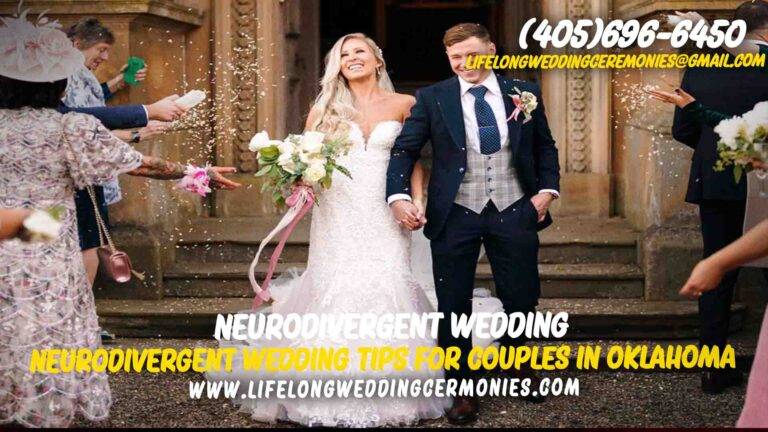Hello, everyone! What we’re talking about here is something that is close to my heart: accommodations for autistic and other neurodivergent wedding couples within the state of Oklahoma. Weddings are a celebratory union of love and matrimony—yet in the case of the neurodivergent, traditional wedding arrangements are just a bit too much. Love and accommodation to their needs aside, we can have a wedding as stress-free and as comfortable as it can possibly be.
Before I proceed with these points, don’t forget to subscribe, like, and hit the notification bell so that you will not miss more diversity-friendly wedding tips and advice. Let’s begin!
1. Creating a Sensory-Friendly Environment
One of the biggest things when it comes to wedding planning for neurodivergent couples is to make sure that the venue minimizes sensory overload. Most autistics have too many people, too much noise, and even too many lights stressing them or something terrible happening.
- Attempt to attempt to manage the following:
- Dimming the light or creating less harsh sun than cold fluorescent lights.
- Limiting the decibel noise level of loud music during reception and ceremony hours; quieter hours can be a blessing.
Creating serene spaces where the couple and guests can relax if the energy is too intense. Collaborate with your venue to modify lighting and acoustics. If possible, provide sensory-friendly options such as ear defenders or a peaceful room.
2. Adaptive Timing and Planning
Wedding planning can be organized, and it is difficult for neurodivergent couples who may require more time between things. Being flexible is the name of the game.
- Insert breaks
- Give a flexible schedule
- Give explicit communication
In doing so, not only does it reduce stress but leads to a happier, tailored experience.
3. Explicit Communication and Visual Aids
Neurodiverse people are helped by direct, clear language. Most autistic adults need to use visual aids, which give a general picture of what is going to happen.
Think about:
- Having the day plan outlined in detail and also visually. Using color coding or icons to jot down different aspects of the ceremony.
- Having clear signposting throughout the building showing where different things will be happening.
- Having pre-walk-through ceremonies so the bride and groom and guests are in the know, totally, as to what is going to occur and where.
This adds up calming clarity and has everyone well-prepared and relaxed.
4. Personalized Sensory and Comfort Options
Every wedding couple is different, and with neurodivergent couples, personalized options can be gigantic. Ask ahead of time if they have special likes and things which they would like changed.
Take
- Personalizing the decorations using calming colors and textures the couple love to relax with.
- Like incorporating extra seating for specific guests who are averse to certain textures or materials.
- Providing stress balls or fidget toys openly at tables or in certain locations, which can help calm nervous guests.
By making these selections personalized, you help the couple and their family feel genuine and special.
5. Involving the Couple in Decision-Making
It is best to involve the couple in every step of the planning process. Ongoing communication regarding what would make them uncomfortable and cooperative efforts towards developing ideas of the solutions will empower the couple and allow for planning a wedding that will meet their needs.
Make the couple:
- Openly discuss their sensory likes and dislikes.
- Discuss concerns with vendors and family members ahead of time.
Follow each facet of the day’s events, from reception to ceremony, though to enable there is something provided to meet sensory or structural needs. This is a degree of teamwork that not only values their individuality but ensures their ecstasy and comfort are paramount to all considerations.
6. Wedding Staff and Vendor Training
Another factor is that all the people who are working on, and are part of, the wedding—staff, vendors, and family members—must be trained and understanding of the needs of the neurodivergent guests.
What you can do:
Train vendors or orient vendors to work with neurodivergent individuals. Setting clear expectations about patience, simple language, and not giving too much stimulation can be extremely helpful. Make vendors more flexible with their service. For example, a photographer would need to spend more time getting candid photos, or a DJ would need to change the volume and song list according to the couple’s feedback.
Assign an individual who would handle all these adjustments on the wedding day. By ensuring that all the people you work with are extremely smart and compassionate, you establish a consistent, loving environment for the couple and wedding party.
7. Stress-Free Positive Environment as a Priority
Seriously, what you need is a gorgeous, stress-free wedding day—a day where everyone is just celebrating love. Even with special requirements in place, a positive environment will put things back on track.
As an officiant, your role is to establish a soothing atmosphere from the beginning. Your presence can be a comfort to the couple and their bridal party that all will be well. Incorporate a little relaxation or mindfulness breaks into the ceremony. For example, an immediate guided moment of deep breathing or a moment of reflection to release any tension building.
In wonder at the wonder of it all. Remembering all of us that every wedding is unique, and what isn’t customary for one is just perfect—and even lovely—for this couple.
Conclusion: Creating a Wedding Day That Celebrates Every Love
Ultimately, having an autistic and other neurodivergent couples’ wedding in Oklahoma is less about being unique, understanding, and sympathetic and more about logistics—it’s about making sure all the accommodations, all the differences, and all the considerations all dovetail to create a space where love can most be celebrated.
In doing sensory-friendly rooms, employing direct communication, engaging the couple in every decision, and making sure all vendors and staff are informed of their needs, you can have a wedding day that not only appears gorgeous but is very meaningful.
Thanks for being here today as we navigated through these special considerations. Remember that, as a wedding officiant, it’s your job to honor each couple’s own love story and to create each wedding a happy, safe, and memorable experience.
If this video has been useful to you, please like, share, and subscribe for more inclusive wedding planning advice and insights from the wedding officiant’s point of view. Your pledge to making your wedding a secure and welcoming environment for all couples is the game-changer.



